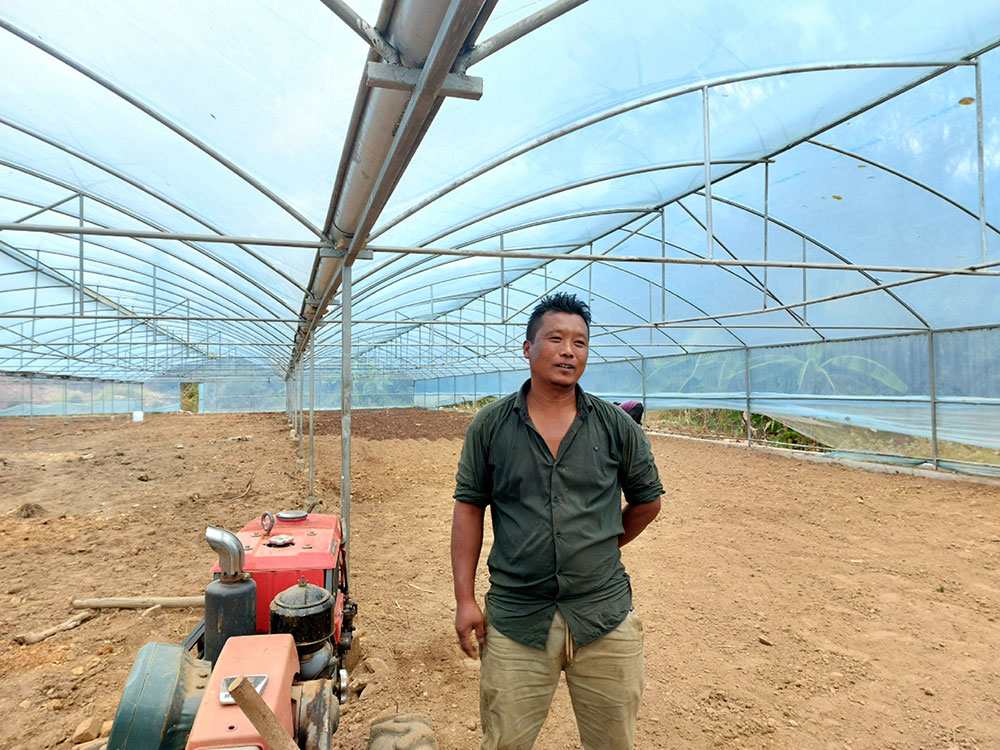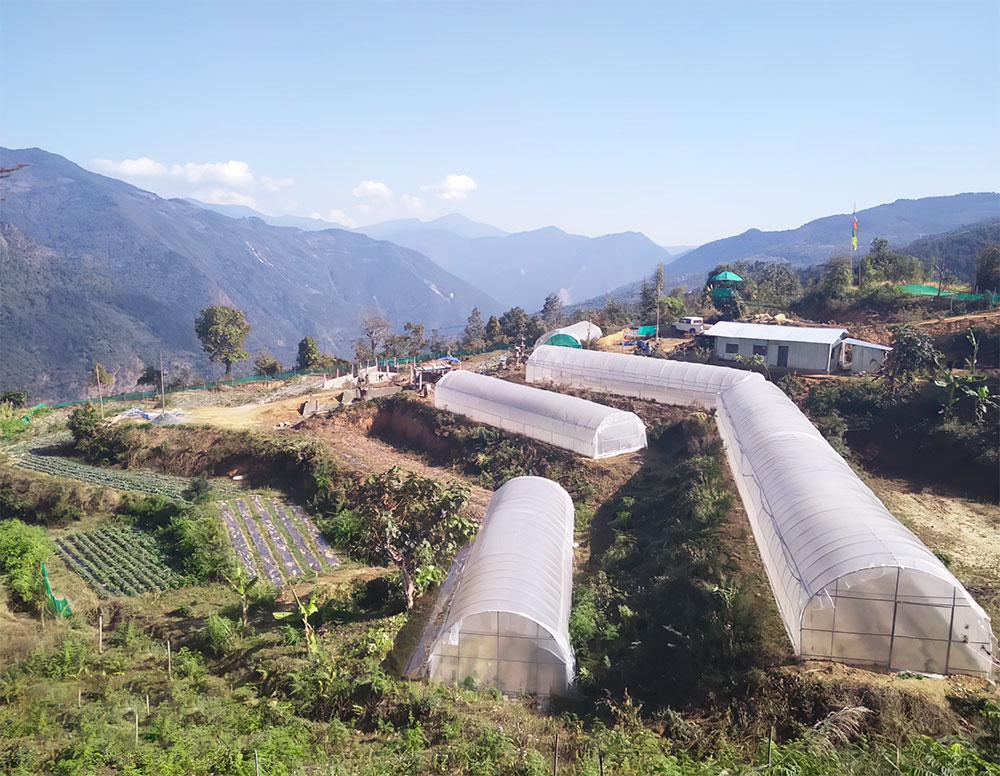Choki Wangmo | Dagana
For almost half a decade, Hochu Leki, 39, and his wife Rinchen Dema invested their time and resources to complete the country’s first mega polyhouse that uses climate smart agricultural methods for optimised production in Gangzur, Dagana.
Agriculture is a never-ending job. More so when it is a farm on 60-decimals of land with a 100/24-metre greenhouse, the size of 24 normal-sized greenhouses.
For the past several weeks, Hochu had been preparing land for big green chili production by the end of this month. He wants to focus on high-value crops such as chilies and tomatoes that are in short supply in the country.

Hochu Leki
The mega polyhouse, built at a cost of more than Nu three million, has yet to be completed. Mobile-controlled smart irrigation, side ventilation, drainage system, drip irrigation, rain harvesting, and mulching plastics are some of the smart agricultural initiatives he wants to use on his farm to produce food in the face of rising climate change impacts in recent years.
These methods, he expects, will reduce human-wildlife conflict, pest infestation, and protect crops from harsh climatic conditions such as windstorms and hailstorms.
He said that after mandarin production was affected in his chiwog, he planted guava trees, but half the produce was lost to the monkeys.
When asked what inspired him to invest in such projects laden with risks and uncertainties, he says that he was working as a contractor in the past, but with the right support from the gewog agriculture extension officer, Bikash Tamang, he was determined. Before his project was approved under the Economic Contingency Plan, Hochu’s hard work didn’t reap many results.
He now plans to employ youth on his farm.
Like Hochu, many farmers in Dagana are venturing into commercial farming under various projects. About 10 farmers in Kana Gewog, with support from the Food Security and Agriculture Productivity Project, are focused on climate smart agriculture that uses materials like pre-fabricated polyhouses, plastic sheets to harvest rain and spring water, plastic mulching, and drip irrigation sets.
An integrated farming practitioner, Phul Maya Katwal, said that as the climate change impact increases, conventional methods of farming are no longer practical.
On her 2.9-acre land, she grows mandarins and vegetables. She said that climate smart agriculture has helped increase production at a lower cost. She uses mulching plastic, a greenhouse, drip irrigation, water harvesting, and a biodigester on her farm.
During the monsoon, she said that due to topsoil erosion, the yield was low. “But the mulching plastic has made a difference.”
“Except for bird pests, pest infestation has been reduced, too,” she said.
In lower Tshendagang, 28-year-old Abi Narayan Bahuwn, is a progressive farmer. In 2019, he revived 3.48 acres of land that have been fallow for more than two decades. His farm has integrated vegetable and fruit production, a fishery, poultry, and livestock.
He harvested 700 kilograms of chilies last season.
“My farm is 99 percent organic,” he said.
Bikash Tamang said that farmers are now so used to growing crops using mulching plastic that they now refuse to work without it. “With mulching plastic, farmers do not have to weed.”
He said that the agriculture sector still appears non-lucrative to the younger age group because they have an image of farming as a manual job. He, however, said that this mindset can be changed through mechanisation and the use of farm technologies.
Climate smart agriculture uses water management methods and encourages protected culture of growing crops.
The challenges, however, are aplenty. Shortage of water and a lack of marketing facilities are discouraging some farmers.
Phul Maya Katwal said that although production has increased through climate smart agriculture methods, marketing is a hurdle. Without a market, half of her produce goes to waste.
Creating a brand such as a Dagana sales outlet in the Centenary Farmers Market could solve the challenge, she said, adding that involvement of middlemen is the reason for hiked vegetable prices across the country.
Value addition, she said, could be a way forward but they need support and training.
With drying water sources in the gewog, she is worried about water shortages on the farm. “We are not allowed to use drinking water in the field.”
Hochu Leki is looking into bringing irrigation water in from a private source. “Irrigation water is indispensable for increased production.”
Abi Narayan said that while any agriculture-related projects target the educated young people, dedicated farmers are left behind without access to opportunities. “They set a requirement for agriculture grants and illiterate people are handicapped. There are capable farmers.”
Kana gewog’s agriculture extension officer Tshering Wangchuk said that the gewog is looking into value addition initiatives to help people sell their produce. “Pickling is lucrative.”
But, consumer support is a must, he said.


